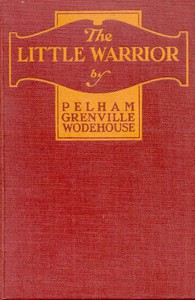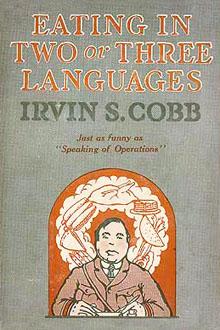The Little Warrior by P. G. Wodehouse (top 50 books to read txt) 📗

- Author: P. G. Wodehouse
Book online «The Little Warrior by P. G. Wodehouse (top 50 books to read txt) 📗». Author P. G. Wodehouse
Yet, now that the shock of it was dying away, she began to remember signs she would have noticed, speeches which ought to have warned her …
“Wally!” she gasped.
She found that he affected her in an entirely different fashion from the luckless dozen of those London days. He seemed to matter more, to be more important, almost—though she rebelled at the word—more dangerous.
“Let me take you out of it all! You aren’t fit for this sort of life. I can’t bear to see you …”
Jill bent forward and touched his hand. He started as though he had been burned. The muscles of his throat were working.
“Wally, it’s—” She paused for a word. “Kind” was horrible. It would have sounded cold, almost supercilious. “Sweet” was the sort of thing she could imagine Lois Penham saying to her friend Izzy. She began her sentence again. “You’re a dear to say that, but …”
Wally laughed chokingly.
“You think I’m altruistic? I’m not. I’m just as selfish and self-centered as any other man who wants a thing very badly. I’m as altruistic as a child crying for the moon. I want you to marry me because I love you, because there never was anybody like you, because you’re the whole world, because I always have loved you. I’ve been dreaming about you for a dozen years, thinking about you, wondering about you—wondering where you were, what you were doing, how you looked. I used to think that it was just sentimentality, that you merely stood for a time of my life when I was happier than I have ever been since. I used to think that you were just a sort of peg on which I was hanging a pleasant sentimental regret for days which could never come back. You were a memory that seemed to personify all the other memories of the best time of my life. You were the goddess of old associations. Then I met you in London, and it was different. I wanted you—you! I didn’t want you because you recalled old times and were associated with dead happiness, I wanted you! I knew I loved you directly you spoke to me at the theatre that night of the fire. I loved your voice and your eyes and your smile and your courage. And then you told me you were engaged. I might have expected it, but I couldn’t keep my jealousy from showing itself, and you snubbed me as I deserved. But now … things are different now. Everything’s different, except my love.”
Jill turned her face to the wall beside her. A man at the next table, a corpulent red-faced man, had begun to stare. He could have heard nothing, for Wally had spoken in a low voice; but plainly he was aware that something more interesting was happening at their table than at any of the other tables, and he was watching with a bovine inquisitiveness which affected Jill with a sense of outrage. A moment before, she had resented the indifference of the outer world. Now, this one staring man seemed like a watching multitude. There were tears in her eyes, and she felt that the red-faced man suspected it.
“Wally …” Her voice broke. “It’s impossible.”
“Why? Why, Jill?”
“Because … Oh, it’s impossible!”
There was a silence.
“Because …” He seemed to find a difficulty in speaking, “Because of Underhill?”
Jill nodded. She felt wretched. The monstrous incongruity of her surroundings oppressed her. The orchestra dashed into a rollicking melody, which set her foot tapping in spite of herself. At a near-by table somebody was shouting with laughter. Two waiters at a service-stand were close enough for her to catch snatches of their talk. They were arguing about an order of fried potatoes. Once again her feelings veered round, and she loathed the detachment of the world. Her heart ached for Wally. She could not look at him, but she knew exactly what she would see if she did,—honest, pleading eyes searching her face for something which she could not give.
“Yes,” she said.
The table creaked. Wally was leaning further forward. He seemed like something large and pathetic,—a big dog in trouble. She hated to be hurting him. And all the time her foot tapped accompaniment to the rag-time tune.
“But you can’t live all your life with a memory,” said Wally.
Jill turned and faced him. His eyes seemed to leap at her, and they were just as she had pictured them.
“You don’t understand,” she said gently. “You don’t understand.”
“It’s ended. It’s over.”
Jill shook her head.
“You can’t still love him, after what has happened!”
“I don’t know,” said Jill unhappily.
The words seemed to bewilder Wally as much as they had bewildered Freddie.
“You don’t know!”
Jill shut her eyes tight. Wally quivered. It was a trick she had had as a child. In perplexity, she had always screwed up her eyes just like that, as if to shut herself up in herself.
“Don’t talk for a minute, Wally,” she said. “I want to think.”
Her eyes opened.
“It’s like this,” she said. He had seen her look at him exactly the same way a hundred times. “I don’t suppose I can make you understand, but this is how it is. Suppose you had a room, and it was full of things. Furniture. And there wasn’t any space left. You—you couldn’t put anything else in till you had taken all that out, could you? It might not be worth anything, but it would still be there taking up all the room.”
Wally nodded.
“Yes,” he said. “I see.”
“My heart’s full, Wally dear. I know it’s just lumber that’s choking it up, but it’s difficult to get it out. It takes time getting it out. I put it in, thinking it was wonderful furniture, the most wonderful in the world, and—I was cheated. It was just lumber. But it’s there. It’s still there. It’s there all the time. And what am I to do?”
The orchestra crashed, and was silent. The sudden stillness seemed to break a spell. The world invaded the little island where they sat. A chattering party of girls and men brushed past them. The waiter, judging that they had been there long enough, slipped a strip of paper, decorously turned upside down, in front of Wally. He took the money, and went away to get change.
Wally turned to Jill.
“I understand,” he said. “All this hasn’t happened, and we’re just as good pals as before?”
“Yes.”
“But …” He forced a laugh … “mark my words, a time may come, and then … !”
“I don’t know,” said Jill.
“A time may come,” repeated Wally. “At any rate, let me think so. It has nothing to do with me. It’s for you to decide, absolutely. I’m not going to pursue you with my addresses! If ever you get that room of yours emptied, you won’t have to hang out a ‘To Let’ sign. I shall be waiting and you will know where to find me. And, in the meantime, yours to command, Wallace Mason. Is that clear?”
“Quite clear.” Jill looked at him affectionately. “There’s nobody I’d rather open that room to than you, Wally. You know that.”
“Is that the solemn truth?”
“The solemn truth!”
“Then,” said Wally, “in two minutes you will see a startled waiter. There will be about fourteen dollars change out of that twenty he took away. I’m going to give it all to him.”
“You mustn’t!”
“Every cent!” said Wally firm. “And the young Greek brigand who stole my hat at the door is going to get a dollar! That, as our ascetic and honorable friend Goble would say, is the sort of little guy I am!”
The red-faced man at the next table eyed them as they went out, leaving behind them a waiter who clutched totteringly for support at the back of a chair.
“Had a row,” he decided, “but made it up.”
He called for a toothpick.
On the boardwalk at Atlantic City, that much-enduring seashore resort which has been the birthplace of so many musical plays, there stands an all-day and all-night restaurant, under the same management and offering the same hospitality as the one in Columbus Circle at which Jill had taken her first meal on arriving in New York. At least, its hospitality is noisy during the waking and working hours of the day; but there are moments when it has an almost cloistral peace, and the customer, abashed by the cold calm of its snowy marble and the silent gravity of the white-robed attendants, unconsciously lowers his voice and tries to keep his feet from shuffling, like one in a temple. The members of the chorus of “The Rose of America,” dropping in by ones and twos at six o’clock in the morning about two weeks after the events recorded in the last chapter, spoke in whispers and gave their orders for breakfast in a subdued undertone.
The dress-rehearsal had just dragged its weary length to a close. It is the custom of the dwellers in Atlantic City, who seem to live entirely for pleasure, to attend a species of vaudeville performance—incorrectly termed a sacred concert—on Sunday nights: and it had been one o’clock in the morning before the concert scenery could be moved out of the theatre and the first act set of “The Rose of America” moved in. And, as by some unwritten law of the drama no dress-rehearsal can begin without a delay of at least an hour and a half, the curtain had not gone up on Mr Miller’s opening chorus till half past two. There had been dress-parades, conferences, interminable arguments between the stage-director and a mysterious man in shirtsleeves about the lights, more dress-parades, further conferences, hitches with regard to the sets, and another outbreak of debate on the subject of blues, ambers, and the management of the “spot,” which was worked by a plaintive voice, answering to the name of Charlie, at the back of the family circle. But by six o’clock a complete, if ragged, performance had been given, and the chorus, who had partaken of no nourishment since dinner on the previous night, had limped off round the corner for a bite of breakfast before going to bed.
They were a battered and a draggled company, some with dark circles beneath their eyes, others blooming with the unnatural scarlet of the make-up which they had been too tired to take off. The Duchess, haughty to the last, had fallen asleep with her head on the table. The red-headed Babe was lying back in her chair, staring at the ceiling. The Southern girl blinked like an owl at the morning sunshine out on the boardwalk.
The Cherub, whose triumphant youth had brought her almost fresh through a sleepless night, contributed the only remark made during the interval of waiting for the meal.
“The fascination of a thtage life! Why girls leave home!” She looked at her reflection in the little mirror of her vanity-bag. “It is a face!” she murmured reflectively. “But I should hate to have to go around with it long!”
A sallow young man, with the alertness peculiar to those who work on the night-shifts of restaurants, dumped a tray down on the table with a clatter. The Duchess woke up. Babe took her eyes off the ceiling. The Southern girl ceased to look at the sunshine. Already, at the mere sight of food, the extraordinary recuperative powers of the theatrical worker had begun to assert themselves. In five minutes these girls would be feeling completely restored and fit for anything.
Conversation broke out with the first sip of coffee, and the calm of the restaurant was shattered. Its day had begun.
“It’s a great life if you don’t weaken,” said the Cherub, hungrily attacking her omelette. “And the wortht is yet to come! I thuppose all you old dears realithe that this show will have to be rewritten from end to end, and we’ll be rehearthing day and night all the time we’re on the road.”
“Why?” Lois Denham spoke with her mouth full. “What’s wrong with it?”
The Duchess took a sip of coffee.
“Don’t make me laugh!” she pleaded. “What’s wrong with it? What’s right with it, one would feel more inclined to ask!”
“One would feel thtill more inclined,” said the Cherub, “to athk why one was thuch a chump as to let oneself in for this sort of thing when one hears on all sides that waitresses earn thixty dollars a month.”
“The numbers are all right,” argued Babe. “I don’t mean the





Comments (0)